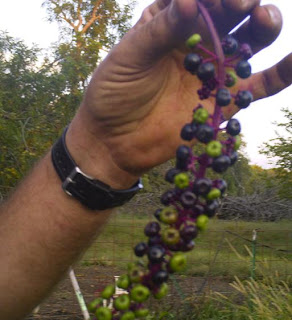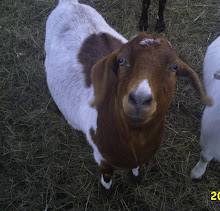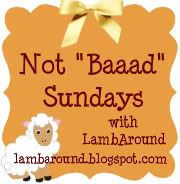 I don't know if someone told my goats that poke sallet was good or maybe they just heard about the Pokeweed festival but for some reason a couple of my goats decided this plant would be a tasty treat several weeks ago. They learned an important lesson that pokeweed is poisonous and not good fodder for goats.
I don't know if someone told my goats that poke sallet was good or maybe they just heard about the Pokeweed festival but for some reason a couple of my goats decided this plant would be a tasty treat several weeks ago. They learned an important lesson that pokeweed is poisonous and not good fodder for goats. Pokeweed by any other name is still poisonous
Pokeweed is an interesting plant but definitely not a plant you want in your livestock pastures. Pokeweed is also sometimes called pokeberry, American nightshade, pigeonberry, bear’s grape or sometimes inkberry because the juice from the berries has been used as a dye. Native Americans used the juice for staining feathers, garments and other things. Folklore suggests that some Native American tribes believed that pokeweed's ability to cause drastic diarrhea and vomiting would expel bad spirits.
Pokeweed can be identified by its reddish-purple stems and drooping clusters of white-green flowers. Its immature berries are green but turn a dark purple in the fall. The leaves are large and it sometimes resembles a small tree, growing up to 10 feet in height.
No Poke Sallet for Me
Some people, especially in the south eat poke sallet. My mom told me she remembers my grandmother taking her and her brother out when they were young children to hunt for “poke” in the spring. This poisonous plant must be cut above its root when it is very young, small and shows no red in the stem; then it must be boiled in two changes of water to render it safe to eat.
Goats and Pokeweed
My experience with this plant started a week or so after I moved three young goat kids to a pasture that had only been home to a horse over the summer. I am observant and aware of poisonous plants in the pastures but somehow I had missed the pokeweed plants that had grown up behind a brush pile in the far corner of this particular pasture. This plant had not been in the pasture before but apparently birds are not affected by the pokeweed berries, which they are quite fond of and will spread the seeds to new locations.
The first sign that something was off was when out of the blue one evening two of the three weanlings in that particular pasture did not come running up to the feeder to get their share of the grain. They just stood under a tree and looked at me. Goats are pigs, especially when it comes to grain. Want to see what I mean? Then check out the food enthusiasm of healthy goats in this video. A goat that is off feed unless it is a doe getting ready to kid is almost always a sick animal.
The kids were somewhat lethargic but responsive and up. I checked their temperatures and that was normal. Their inner eyelids were nice and pink so anemia was not the problem. There was no raspy breathing, coughing, running nose or other symptoms that could be respiratory illness. I quickly noticed one did have scours (diarrhea) and the other one showed signs of abdominal pain by standing stretched out and looking back at his stomach followed by hunching his back. Typically in male goats this could be a warning sign of urinary stones but with both of them getting sick at the same time I doubted that. Then one of them urinated and made that as a cause in this particular case even less likely. I noticed one of them seemed a little bloated and was wet around his mouth from extra salivation.
I removed them from the pasture and put them in a pen with the third kid that still seemed fine. I gave them fresh water, CD antitoxin, Banamine, Fortified B-complex and bloat treatment to coat their stomach and help treat any bloat that might be going on. Neither one of them was deathly sick but they were definitely feeling under the weather.
Finding the Problem
Since two goats got sick at the same time with gastrointestinal symptoms and had recently been moved to a new pasture I did suspect the possibility they may have consumed something poisonous. When you have livestock be prepared for people and even some vets to tell you that your animals won’t eat poisonous plants unless they are starving. This is simply not always true. While it is true some undesirable plants are less palatable, some animals will find certain poisonous plants quite tasty.
The research I have done on pokeweed lends two completely opposite conclusions on this. Some articles say it is quite bitter and livestock avoid it and others say livestock will eat it readily. So with that I can only speak from our experience. These two particular goats were healthy and very well fed. They had access to good hay and twice daily grain feedings. The pasture had a good stand of grass and other safe browse in it, yet when I found the pokeweed it was quite clear these goats had their own little pokeweed party and consumed a fair amount of it. The third goat kid must not have been invited to the party because he never showed any of the symptoms the other two did.
The fact that these were young, inexperienced kids without the influence of older, wiser goats to help lead them to which plants to eat likely played a role. The goat kids that were affected recovered quickly and completely in only about a day and a half with some supportive care and removing them from the source of the poison. Today they are fine and healthy young goats, still looking to get themselves into trouble when they can. The pokeweed was removed from their pasture before they were allowed back out in it
.Pokeweed poisoning in livestock
Some important things to remember about pokeweed are that all parts of this plant are poisonous to both humans and livestock. The roots are considered to be the most dangerous part of the plant. For this reason pigs may be especially at risk of rooting up these plants and being poisoned. Children can be attracted to the berries and can be poisoned by eating them. Some of the symptoms of pokeweed poisoning in livestock may include colic, diarrhea, oral irritation, excessive salivation, depression, weakness and death; although fatalities in goats are not common unless large quantities of the plant are consumed.
If you suspect your goat may have been poisoned by something it is important to prevent further exposure to the poison. You should pen or stall the goat in a quiet place and provide fresh water. Look for samples of the suspected plant to aid in diagnosis. Contact your veterinarian for help with diagnosis and treatment.
It is sometimes difficult to keep track of all the plants in a large livestock pasture but this was a startling reminder that when it comes to toxic plants it pays to be not only aware but extra diligent in the removal of all harmful vegetation hiding in unseen corners and fence rows.
http://www.ppdl.purdue.edu/PPDL/weeklypics/Weekly_Picture7-30-01-1.html
http://www.oardc.ohio-state.edu/weedguide/singlerecord.asp?id=270
http://texnat.tamu.edu/cmplants/toxic/Acrobat/Pokeberry.pdf
http://ohioline.osu.edu/b762/b762_24.html
http://www.greensborobirds.com/2008/08/15/which-birds-eat-pokeweed-berries-and-should-you/
http://weeds.cas.psu.edu/psuweeds/POKEWEED.pdf











21 comments:
As a non goat-owner, I found this oddly fascinating. It's obvious you're taking good care of your goats, though. I'm very familiar with the pokeweed plant, but never knew its name or that it was poisonous. Good thing I'm not a goat, huh?
Great Post!I had no idea Poke was poison !All the old people in my family ate it,as I am sure I did as a kid.Being new to farming I really appreciate when the more experienced folks share their wisdom!
This is so interesting because on our property in MO, we had what we called 'pokeweed' and we dug up the root and boiled it in water. We would then put a washcloth dipped in the water to get rid of poi son ivy. It worked great (when used when the poison was fresh.)! An old timer gave us this tip. Strange than you say the root is poisonous. Maybe the long boiling time leeches the poison out of the root? But, we never had any reaction to digging up the root. Hmmm. Interesting.
Gen-IL Most of the research I did only spoke to how poisonous the root is when eaten but you might find this link interesting. http://bodd.cf.ac.uk/BotDermFolder/PHYT.html I would imagine the act of boiling could have made a difference.
wow....this was very interesting. there is a lot of that plant around here and i never knew it's name. glad your goats recovered. my pup has lyme disease right now. even using frontline she contracted it. she is one sick puppy!
what a great post! You're a great goat mom :-)
thanks for the info. I will have to see if we have that here.
My goats have eaten pokeweed. I've found them with purple spots on them. They've never seem to have had a bad reaction. But I will keep on eye on them. The chickens definitely like it.
Jennifer, glad you were abe to detect and treat the problem.
I always tell people, if you so not know what the plant is, do not let them near it. They will eat it!
Wow, I had no idea these were poisonous! We have some in our yard. I didn't even know what they were called. You said they don't affect birds, do you know if that includes chickens?
Nancy - I was not able to find much information online concerning chickens and pokeweed. I don't have much personal experience with chickens myself to know for sure but I did find this link. http://www.scib.gc.ca/pls/pp/ppack.info?p_psn=12&p_type=all&p_sci=sci&p_x=px It was the only one that said anything at all about chickens. It says they are not affected but turkeys might be. A good place to get information on that might be an online chicken forum, there will be people there with much more chicken experience than I have. Thanks so much for your comment and question. I just wish I could have helped more.
My Dad has cattle but the good and bad thing about cows is they are lazy grazers, they only want soft green grass so they are less likely to eat something that will make them sick. However when I was a teen some year olds when into the hills and ate some sort of forest plants, I will never forget the awful sound a cow makes when trying to barf!
Wow! I had no idea they were poisonous. All my life I have heard of people eating poke leaves. And have had war with the berries. I will definitely be pulling up those when I see them. Although, my horses do not eat them. It's better to be safe than sorry.
I remember being very careful to make sure my girls knew could identify the differences between Elderberry and what we called Deadly Nightshade, when we went Elderberry picking. Great photos and info.
Great post! We don't have POKE weed here, thank heaven!
Linda
http://coloradofarmlife.wordpress.com
Informative post, Jennifer. Thanks for stopping by. I've seen pokeweed all my life, but didn't know it was poisonous. And I'm not a goat person either, altho I do think I'd like them.
Would that I could - package up a few rolls of hay and send it to you - do you think UPS ships hay?
I might be a non-goat owner, but with 3 horses in large pastures, this is just a reminder to be vigilant and check periodically for any new plant growth that could be toxic. Great post, Jennifer!
I'm glad your goats were ok, and that you were alerted to the problem in time.
I too grew up with having poke greens fixed. And ever so often have to make a mess of them to satisfy cravings.
I fed my goats pokeweed as a treat. Had no problems , but i had 20 goats and three pokeweed patches.
4 of 5 goats quite ill, off feed about 3 weeks ago. Couldn't figure out why, in same pasture for 4 years. Was it the pond with almost no water in it that smelled like rotten eggs? Had they gotten down in there? No signs of that. Was it wilting foliage as leaves fell? No answer but getting charcoal and something like mylanta (a quart per goat said the vet)... well had quite the adventure & came out looking like a pokadot girl charcoal and mylanta white... then banamine. took a few days for them to bounce back. Let them into pasture again and not problem for 3 weeks, then one day boom, one looked off. Looking at where they were in pasture in a corner a lot of gnawed pokeweed that triggered memory of childhood on the farm with folks telling us kids about it being poison. So,... most pokeweed now removed from pasture. Why this year they decided to try it who knows...
Sorry to hear you had goats get sick Sandra, I am glad you were able to find out what the problem was!
Post a Comment